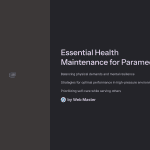 In the demanding world of paramedicine, maintaining optimal health is not just beneficial—it’s essential. Paramedics face unique challenges that require both physical stamina and mental resilience. This guide delves into effective health maintenance strategies tailored for paramedics, ensuring they can perform at their best while safeguarding their well-being.
In the demanding world of paramedicine, maintaining optimal health is not just beneficial—it’s essential. Paramedics face unique challenges that require both physical stamina and mental resilience. This guide delves into effective health maintenance strategies tailored for paramedics, ensuring they can perform at their best while safeguarding their well-being.

Understanding the Physical Demands of Paramedicine
Paramedics often work in high-pressure environments, requiring quick decision-making and physical exertion. The nature of the job includes lifting patients, performing CPR, and working long hours, which can lead to physical strain. Recognizing these demands is the first step toward implementing effective health maintenance strategies.

Implementing a Balanced Fitness Regimen
To meet the physical challenges of their role, paramedics should engage in regular exercise routines that enhance strength, flexibility, and cardiovascular health. Incorporating activities such as weight training, yoga, and aerobic exercises can improve overall fitness, reduce injury risk, and enhance job performance.

Prioritizing Mental Health and Stress Management
The high-stress nature of emergency medical services can take a toll on mental health. Paramedics should adopt stress-reduction techniques such as mindfulness meditation, deep breathing exercises, and seeking support from peers or professional counselors. Prioritizing mental well-being is crucial for sustained performance and personal health.

Ensuring Adequate Rest and Sleep Hygiene
Irregular shifts and long hours can disrupt sleep patterns, leading to fatigue and decreased cognitive function. Establishing good sleep hygiene practices, such as creating a restful environment, maintaining a consistent sleep schedule, and limiting caffeine intake before bedtime, can help mitigate these effects.

Adopting a Nutrient-Rich Diet
A balanced diet rich in essential nutrients supports energy levels and overall health. Paramedics should focus on consuming a variety of fruits, vegetables, lean proteins, and whole grains. Planning and preparing healthy meals can be challenging with a hectic schedule, but it’s vital for maintaining peak performance.

Staying Hydrated on the Job
Dehydration can impair cognitive and physical functions, which are critical in emergency situations. Paramedics should make a conscious effort to drink adequate water throughout their shifts, especially during physically demanding tasks or in hot environments.
Learn More About Stress Management
Nutrition Tips for Shift Workers
*Capturing unauthorized images is prohibited*







